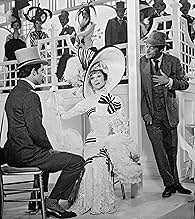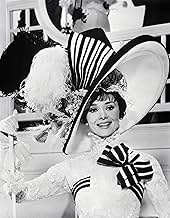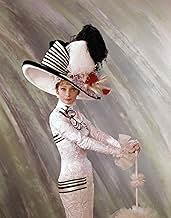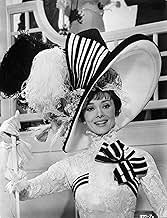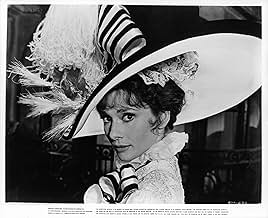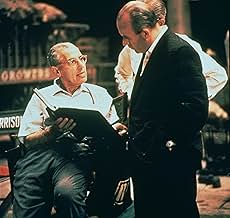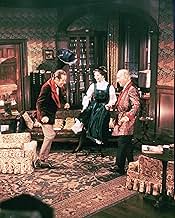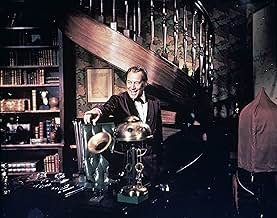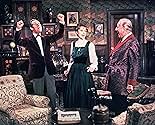Un professeur de phonétique misogyne et snob accepte le pari de transformer une vendeuse de fleurs et la rendre présentable dans la haute société.Un professeur de phonétique misogyne et snob accepte le pari de transformer une vendeuse de fleurs et la rendre présentable dans la haute société.Un professeur de phonétique misogyne et snob accepte le pari de transformer une vendeuse de fleurs et la rendre présentable dans la haute société.
- A remporté 8 oscars
- 26 victoires et 13 nominations au total
Elizabeth Aimers
- Cockney
- (uncredited)
Helen Albrecht
- Ascot Extra
- (uncredited)
John Alderson
- Jamie - Doolittle's crony
- (uncredited)
Mary Alexander
- Cockney
- (uncredited)
Gertrude Astor
- Cockney
- (uncredited)
LaWana Backer
- Ad Lib at Church
- (uncredited)
Walter Bacon
- Ball Guest
- (uncredited)
Best Picture Winners by Year
Best Picture Winners by Year
See the complete list of Best Picture winners. For fun, use the "sort order" function to rank by IMDb rating and other criteria.
Histoire
Le saviez-vous
- AnecdotesCostume designer Cecil Beaton created 1,500 costumes for this movie, with the exception of the pearl white gown Hepburn wears to the Embassy Ball, an original Edwardian specimen Beaton found in an antique shop.
- GaffesWhen Prof. Higgins sings "An Ordinary Man" he turns on several phonographs, seconds later he turns off one of them but all of the sounds stop.
- Citations
Eliza Doolittle: The difference between a lady and a flower girl is not how she behaves, but how she is treated.
- Générique farfeluIn the posters, playbills and the original cast album for the stage version of "My Fair Lady", the credits always read "based on Bernard Shaw's 'Pygmalion' ", letting the audience know what play "My Fair Lady" was actually adapted from. The movie credits simply read "from a play by Bernard Shaw".
- Autres versionsIn the remastered version of the film, some of the scene changes are changed from sudden cuts to wipe outs, as they probably were when the film was released. When CBS Fox released it on video originally, they were changed to sudden cuts.
- ConnexionsFeatured in Toast of the Town: Episode #18.17 (1965)
- Bandes originalesWhy Can't the English?
(1956) (uncredited)
Music by Frederick Loewe
Lyrics by Alan Jay Lerner
Performed by Rex Harrison, Wilfrid Hyde-White, and Audrey Hepburn
Commentaire en vedette
I've seen MY FAIR LADY several times. However, it wasn't until last night that I finally saw the 1938 version of PYGMALION and this was very interesting indeed. It seems that MY FAIR LADY is actually NOT based on the George Bernard Shaw play as much as it's based on the Leslie Howard movie. That's because the dialog (particularly Henry Higgins') is often word-for-word that of the film. Additionally, both films have the same ending--one that is NOT the same as the original play. In the play, the ending was more sad but also much more realistic and consistent with the characters and their growth (or lack thereof in the case of Henry Higgins).
Quality-wise, both films are superb and I enjoyed them immensely. One very obvious difference is that MY FAIR LADY is a musical with lovely songs, so it's a much longer movie. Another is that although Leslie Howard did a very fine job, somehow Rex Harrison came off as grouchier and more entertaining in the lead. Another major difference is that MY FAIR LADY feels more like a comedy and PYGMALION feels much more sad and deeper emotionally. Because it is a bright and colorful musical, the characters in MY FAIR LADY seem a bit less real, but with PYGMALION you are almost brought to tears late in the film.
My recommendation is that you see them both. Both are exquisitely produced and acted and you can't go wrong with either one. I could say more in my review about this film, but considering that there are already a zillion other reviews, I'll end it here.
UPDATE--Only days after posting this review, I got quite a few "not helpfuls". I assume this is from fans who adored this 1964 film. Well, my response is that it can't merit anything more than an 8 because the dialog was directly lifted from the earlier film AND so much of the singing was NOT done by the stars themselves. To me, these are flaws that prevent the film from earning a higher score. And, while I think about it, cannot justify the many 10s I see for the film.
Quality-wise, both films are superb and I enjoyed them immensely. One very obvious difference is that MY FAIR LADY is a musical with lovely songs, so it's a much longer movie. Another is that although Leslie Howard did a very fine job, somehow Rex Harrison came off as grouchier and more entertaining in the lead. Another major difference is that MY FAIR LADY feels more like a comedy and PYGMALION feels much more sad and deeper emotionally. Because it is a bright and colorful musical, the characters in MY FAIR LADY seem a bit less real, but with PYGMALION you are almost brought to tears late in the film.
My recommendation is that you see them both. Both are exquisitely produced and acted and you can't go wrong with either one. I could say more in my review about this film, but considering that there are already a zillion other reviews, I'll end it here.
UPDATE--Only days after posting this review, I got quite a few "not helpfuls". I assume this is from fans who adored this 1964 film. Well, my response is that it can't merit anything more than an 8 because the dialog was directly lifted from the earlier film AND so much of the singing was NOT done by the stars themselves. To me, these are flaws that prevent the film from earning a higher score. And, while I think about it, cannot justify the many 10s I see for the film.
- planktonrules
- 16 mars 2009
- Lien permanent
Meilleurs choix
Connectez-vous pour évaluer et surveiller les recommandations personnalisées
Détails
- Date de sortie
- Pays d’origine
- Site officiel
- Langue
- Aussi connu sous le nom de
- Mi bella dama
- Lieux de tournage
- Stage 16, Warner Brothers Burbank Studios - 4000 Warner Boulevard, Burbank, Californie, États-Unis(Ascot & Ballroom scenes)
- société de production
- Consultez plus de crédits d'entreprise sur IMDbPro
Box-office
- Budget
- 17 000 000 $ US (estimation)
- Brut – États-Unis et Canada
- 72 560 711 $ US
- Fin de semaine d'ouverture – États-Unis et Canada
- 354 764 $ US
- 17 févr. 2019
- Brut – à l'échelle mondiale
- 72 684 726 $ US
- Durée2 heures 50 minutes
- Couleur
- Mixage
- Rapport de forme
- 2.20 : 1
Contribuer à cette page
Suggérer une modification ou ajouter du contenu manquant

Lacune principale
By what name was My Fair Lady (1964) officially released in India in Hindi?
Répondre






